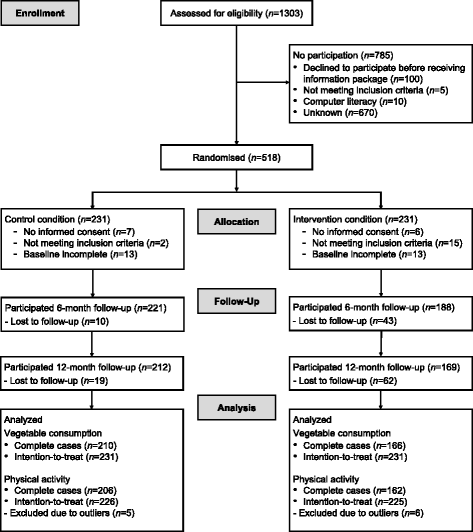Long-term effects of a web-based cancer aftercare intervention on moderate physical activity and vegetable consumption among early cancer survivors: a randomized controlled trial
- PMID: 28187725
- PMCID: PMC5303303
- DOI: 10.1186/s12966-017-0474-2
Long-term effects of a web-based cancer aftercare intervention on moderate physical activity and vegetable consumption among early cancer survivors: a randomized controlled trial
Abstract
Background: The number of cancer survivors is growing. Negative physical and psychosocial consequences of cancer treatment can occur during survivorship. Following healthy lifestyle recommendations is beneficial to increase quality of life and to reduce the risk of cancer recurrence and comorbidities. To meet individual needs, web-based interventions can supply a large population of cancer survivors with easily accessible and personalized information. Evidence concerning the long-term effects of web-based cancer aftercare interventions on lifestyle outcomes is limited. The present study evaluates the 12-month effects of a fully automated web-based cancer aftercare intervention. We investigated whether the previously determined 6-month effects on moderate physical activity and vegetable intake were maintained over 12 months. Possible moderator effects of using specific intervention modules, gender, age, and education were also explored.
Method: A two-armed randomized controlled trial was conducted using online self-report questionnaires among survivors of various types of cancer (N = 462). The intervention group had access to the online intervention for 6 months, and the control group received access after 12-months. Multilevel linear regression analyses (complete cases and intention-to-treat) were conducted to explore 12- month effects.
Results: A significant intervention effect after 12 months was found for moderate physical activity (complete cases: B = 128.475, p = .010, d = .35; intention-to-treat: B = 129.473, p = .011). Age was the only significant moderator (p = .010), with the intervention being effective among participants aged younger than 57 years (B = 256.549, p = .000, d = .59). No significant intervention effect remained for vegetable consumption after 12 months (complete cases: B = 5.860, p = .121; intention-to-treat: B = 5.560, p = .132).
Conclusion: The online cancer after care intervention is effective in increasing and maintaining moderate physical activity in the long term among early cancer survivors younger than 57 years. Short-term increases in vegetable consumption were not sustained in the long term. These findings indicate the value and potential of eHealth interventions for cancer survivors. Based on the study results, web-based self-management interventions could be recommended for younger cancer survivors (<57 years of age) as a possible method to increase physical activity.
Trial registration: Dutch Trial Register NTR3375 . Registered 29 March 2012.
Keywords: Cancer survivorship; Computer tailoring; Long-term effect; Physical activity; Vegetable consumption; Web-based intervention; eHealth.
Figures
References
-
- Cancer Research UK, London. 2016. Worldwide cancer statistics. http://www.cancerresearchuk.org/health-professional/cancer-statistics/wo.... Accessed 1 May 2016
-
- World Health Organization. 2016. Cancer Fact Sheet. http://www.who.int/mediacentre/factsheets/fs297/en/. Accessed 1 May 2016
-
- Deckx L, Van Abbema DL, van den Akker M, van den Broeke C, Van Driel M, Bulens P, Tjan-Heijnen VC, Kenis C, De Jonge ET, Houben B, Buntinx F. A cohort study on the evolution of psychosocial problems in older patients with breast or colorectal cancer: comparison with younger cancer patients and older primary care patients without cancer. BMC Geriatr. 2015;15:79. doi: 10.1186/s12877-015-0071-7. - DOI - PMC - PubMed
Publication types
MeSH terms
Associated data
LinkOut - more resources
Full Text Sources
Other Literature Sources
Medical



